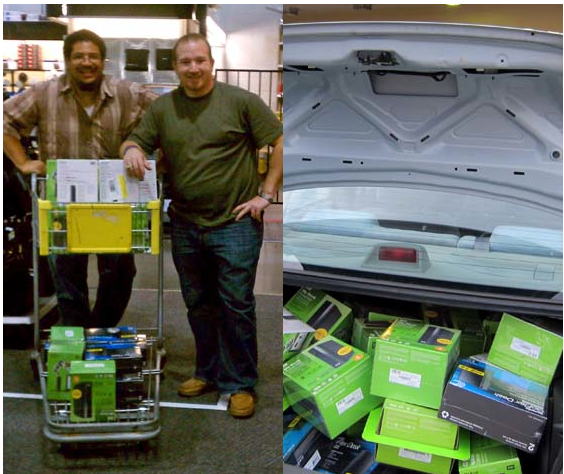A blog post on Backblaze’s web site shares stories from employees, friends, and families about how they participated in a “hard drive farming.” In this scheme, they purchased external hard drives two at a time from retail stores and sent them to Backblaze to help the company survive a worldwide hard drive shortage. Although the stories are engaging and the images are amusing, underneath it’s a story about how climate change affected a Silicon Valley startup’s business plan. The hard drive shortage was caused by unprecedented flooding in Thailand, which produces about half of the world’s hard drives.
Backblaze offers unlimited cloud backups for $5 per month. They use a pod architecture based on off-the-shelf parts. They need about 50TB of new storage per day. Their business model depended on ready access to cheap hard drives.
Around this time last year, Thailand was inundated with catastrophic flooding. About half the world’s hard drives were produced in areas affected by flooding. As a result, there was a shortage of hard drives and prices began to increase. Internal hard drives were the first to be affected. Large systems builders, such as HP and Microsoft bought up the existing supply and prices jumped 200%. External hard drives were less affected. Their prices only increased 10-50%.
In order to stick to their principles of cheap unlimited storage, and stay in business, Backblaze hit upon the idea of buying external hard drives, shucking the cases (and violating the warranty in the process), and using the drives in their pods. This worked for a while until retailers began limiting the drives to 2 per purchase. After some of their employees were banned from various Best Buy and Costco stores in the bay area, Backblaze began enlisting their friends and families across the country to buy external hard drives. They called this hard drive farming. There is some funny video on the Backblaze blog from various employees and relatives recounting their participation in this scheme.
On the face of it, this is a tech story. Or a human interest story. But really, it’s a cautionary tale about about climate change. In a video, CEO Gelb Budman recounts how their risk analysis didn’t take flooding into consideration. He said,
“Five years ago when we started Backblaze, we thought of lots of things that might a risk to this company. Would we be able to hire the right team? Would customers want the product we were building? Could we scale? Could we do it affordably? There were lots of concerns. One thing that we never thought was a risk to the company was a flood in Thailand.
The floods in Thailand are symptomatic of climate change. They were extreme and unprecedented. Areas that normally experience flooding were relatively unscathed. Other areas that normally stayed dry were overwhelmed. A single event is not definitive proof of climate change, but these trends are world wide. An extreme and prolonged heat wave in Europe. Flooding in Pakistan. Unusually mild winter in Canada. Drought in the US. A late frost kills an apple crop in Southern Ontario. Furthermore, the evidence is clear that climate change is real.
Shortages and disruptions are coming. How severe they will be remains to be seen. Gwynne Dyer has written a book, “Climate Wars,” that looks at the repercussions of climate change. CBC Ideas has a two-part series based on the book. Based on his conversations with scientists and military leaders, he concluded that climate change was going to cause wars and that these wars would primarily be over unequal access to resources, such as food and water.
In the developed world, we are largely insulated from many of these issues. Although food prices are rising around the world, we only spend 5-10% of our expendable income on what we eat. People in poor countries spend more, 30-50% of their income. But we won’t be protected from all the consequences. Even a Silicon Valley start up can be affected by a flood in Thailand. It’s a small world after all.

